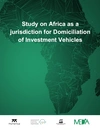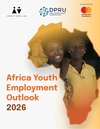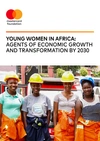Acknowledgement
This report presents the key findings of a landscape Study on Africa as a jurisdiction for the domiciliation of Investment Vehicles, commissioned by the Mastercard Foundation in partnership with Mennonite Economic Development Associates (MEDA), and conducted by a team of experts from across Africa and the globe, including Momentus Global (formerly International Financial Consulting Ltd.), Samawati Capital Partners, and Stafford Law.
The following individuals contributed to the fieldwork, analysis and presentation of this report: Samuel Ndonga, Eugene Ntananga, Jeff Temba, Paul Mugerwa, Maame Tutua Dadson, Stephen Antwi-Asimeng, Nelson Amo, Aziza Atta, Gwen Abiola-Oloke, Diana Smallridge, Jyoti Maheshwari, Horlane Mbayo, Nzwaki Adonisi, Alison Francis, Velma McColl and Kayla Caesar. In addition, the report team extend special thanks to Mercy Mutua, Susan Forester, Vymala Thuron and Nathalie Akon for their valuable contributions.
Disclaimer: The insights and conclusions presented in this report are based on inputs gathered from stakeholders consulted as part of this Study and may not be representative of all participants and perspectives across the ecosystem. The focus of this Study is on the private capital ecosystem in Africa. The report aims to provide an overview of the current landscape and opportunities based on the information available at the time of writing. The fieldwork for this report was completed in May 2024, with updates added in October 2024 to reflect recent market and ecosystem developments. Readers are advised that the policy and regulatory environment is continuously evolving, and the analysis or recommendations contained herein may need to be updated over time.
Executive Summary
Introduction
Background to the report
This report summary outlines the potential of investment vehicle domiciliation in African jurisdictions to mobilise and diversify investment capital for growth-oriented MSMEs. It presents the findings of a report commissioned by the Mastercard Foundation and conducted by Momentus Global, Stafford Law, and Samawati Capital Partners in response to an observed gap in domiciliation that limits the availability of capital for MSMEs that could drive economic growth and opportunity across Africa.
The Africa Growth Fund,1 led by the Mennonite Economic Development Associates (MEDA),2 was established in 2022 to prioritise African Investment Vehicles and catalyse African-based investment capital with a gender lens. The search for African-based Investment Vehicles (IVs) to serve as partners to the Fund revealed the scarcity of African-domiciled Investment Vehicles – and ignited efforts to encourage and increase the diversity of Investment Vehicles on the African continent. The hypothesis behind the Study is that increased domiciliation will attract more international capital to the African continent and catalyse local capital mobilisation, which will grow the investment ecosystem in Africa, promoting economic growth and transformation and bolstering dignified work opportunities for young people who comprise 70% of the population in the continent.
The report examines why and how investors choose fund domiciliation jurisdictions and what Africa needs to do to become a preferred destination. The report includes a landscape assessment of 13 African, and 4 global investment destinations based on literature reviews and extensive stakeholder consultations. The report compares global investment vehicle domiciliation jurisdiction trends with the African context, relying on insights from investors, fund managers, regulators, and other ecosystem enablers and a detailed analysis of 13 African jurisdictions. The report aims to catalyse systemic change in the Investment Vehicles and capital market ecosystem by enhancing Africa's competitiveness and ensuring inclusive growth. It highlights emerging trends, growth drivers, key sectors, and the size of funds in Africa's investment landscape.
This report maps a path toward increasing the domiciliation of IVs in Africa. It presents insights gathered on the drivers of domiciliation decisions and the potential contribution of increased domiciliation in African jurisdictions to MSME growth and job creation. The document details the potential impact of domiciliation and then provides an overview and assessment of African jurisdictions’ level of preparedness to attract IVs to domicile in these respective jurisdictions. It subsequently provides further detail on what it takes to increase domiciliation in Africa and provides stakeholder-specific, actionable, recommendations on developing attractive ecosystems for domiciliation. The report underscores Africa's potential as a domiciliation hub but emphasises the need for improvements in regulatory frameworks, operational efficiency, and domestic capital mobilisation. It highlights the urgent need for African jurisdictions to enhance their regulatory environments, oversight, and enforcement to attract more investment. The report emphasises that operational efficiency and an enabling environment are crucial for fund domiciliation, and mobilising domestic capital is essential for the growth of local Investment Vehicles.
The three-fold purpose of the study is as follows:
Firstly, for the investment vehicle ecosystem, the report contributes to field building and expanding the body of knowledge and evidence on the topic - investment vehicle domiciliation in Africa. The study and its outcomes enhance the existing body of knowledge and analytical tools related to Africa-based Investment Vehicles. This involves illuminating opportunities, identifying the barriers that hinder Africa from becoming an attractive jurisdiction for investment vehicle domiciliation and proposing strategies to improve enabling conditions for Investment Vehicles and facilitate greater domiciliation on the continent. A distinctive feature of the report is the introduction of a new analytical tool - the Fund Domiciliation Maturity Diagnostic Tool (FDMDT), designed to assess the attractiveness of African jurisdictions.
Secondly, the report aims to inspire solutions-oriented dialogue and engagement among relevant investment vehicle stakeholders to enhance investment vehicle conditions, thereby fostering greater domiciliation on the African continent. The study and its outcomes are intended to stimulate dialogue and serve as a crucial input into evidence-based discussions among state and non-state actors within the investment vehicle ecosystem. These dialogues should result in improved understanding and appreciation of the opportunities associated with increased investment vehicle domiciliation and inspire commitment to action towards better-enabling conditions. Ultimately, it aims to collectively develop the necessary conditions to make Africa an attractive destination for international capital and catalyse local capital mobilisation.
Thirdly, the report aims to motivate and guide pertinent investment vehicle ecosystem stakeholders in taking action toward unlocking the potential of African jurisdictions as attractive destinations for investment vehicle domiciliation. The report and its outcomes serve as an actionable tool, providing targeted technical guidance and advice to African state actors, including policymakers and regulators. This guidance is designed to help key stakeholders develop and manage investment vehicle ecosystems that are conducive and capable of attracting Investment Vehicles. As such, individuals and entities seeking to incentivise Investment Vehicles to domicile on the continent and stimulate capital flows will find this report particularly valuable.
Methodology
The literature review of the global domiciliation landscape and extensive consultations held with key ecosystem players as part of the Study highlighted that a mature Fund domiciliation jurisdiction is characterised by several key characteristics, which have been grouped into four main common parameters:
- Regulatory environment, oversight, and enforcement
- Judiciary framework
- Operational efficiency
- Enabling environment
The Fund Domiciliation Maturity Diagnostic Tool (FDMDT) parameters capture key parameters and sub-dimensions that investors and Fund managers use to evaluate a jurisdiction’s attractiveness as a Fund domicile. The 16 key dimensions, both individually and together, paint a fuller picture of a mature environment for the domiciliation of Investment Vehicles based on inputs received through our desk research and consultations.
Read the report on Caribou's website.
Downloads
-
Read the full report
Download



